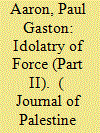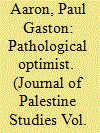|
|
|
Sort Order |
|
|
|
Items / Page
|
|
|
|
|
|
|
| Srl | Item |
| 1 |
ID:
155903


|
|
|
|
|
| Summary/Abstract |
Not until the Second Intifada did assassination emerge as an explicit, legally codified, and publicly announced doctrine of so-called targeted killing in Israel. This study, the first of a two-part series, explores the doctrine’s historical roots and ideological lineage and tracks its rise under the premiership of Ariel Sharon. Targeted killing became institutionalized not just to reduce direct and imminent threats against Israelis but also to mobilize electoral support, fieldtest weapons and tactics, and eliminate key figures in order to sow chaos and stunt the development of an effective Palestinian national movement. The study frames the analysis within a wider meditation on Israel’s idolatry of force. As much symbolic performance as military technique, targeted killing reenacts and ritualizes Palestinian humiliation and helplessness in the face of the Zionist state’s irresistible power, making this dynamic appear a fact of life, ordained and immutable.
|
|
|
|
|
|
|
|
|
|
|
|
|
|
|
|
| 2 |
ID:
164818


|
|
|
|
|
| Summary/Abstract |
Building on “The Idolatry of Force: How Israel Embraced Targeted Killing,” published in the Autumn 2017 issue of the Journal of Palestine Studies, this companion piece examines the practices through which Israel's garrison state normalizes aggressive militarism and indifference to the pain of others. Political discourse and semantics, media, pedagogical instruction, religious training, and the shared experience of army service all feed into a warrior code and culture where combat and preparations for combat become second nature, and where violence, no matter how extreme and disproportionate, assumes collective legitimacy. A broad rhetorical repertoire is deployed to craft a narrative of virtue, sacrifice, and necessity. Key to this narrative are the threat to national survival posed by demonic enemies and the spiritual valor embodied and replenished in the struggle to vanquish them.
|
|
|
|
|
|
|
|
|
|
|
|
|
|
|
|
| 3 |
ID:
144594


|
|
|
|
|
| Summary/Abstract |
This short biography of Dr. Eyad El Sarraj, the founder of the Gaza Community Mental Health Programme, describes his formative experiences under Israeli occupation, his education, and his professional life, including interactions with Palestinian and Israeli colleagues. El Sarraj's vision of collective resistance, his stubborn ‘pathological optimism,’ and his devotion to the dignity and well-being of his patients and the people of the Gaza Strip in the face of unrelenting Israeli state violence are colorfully described by his colleague and long-time friend Paul Aaron.
|
|
|
|
|
|
|
|
|
|
|
|
|
|
|
|
|
|
|
|
|